The Unhealthy Coping Mechanisms of Every Myers-Briggs® Personality Type
In the personality community, we talk a lot about the idealized versions of our types. The INFJ is mystical, compassionate, empathic. The ESTJ is a leader, strong, capable, logical. While it’s amazing to know all the positive qualities of each type, sometimes there are not-so-positive qualities that overtake us when we feel that our ego is threatened. Let’s take a look at some of the ways each personality type tries to defend their ego.
Not sure what your personality type is? Take our new personality questionnaire here. Or you can take the official MBTI® here.
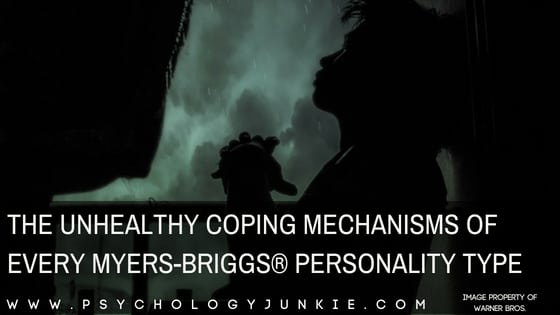
Signs You Might Be Using Unhealthy Coping Mechanisms, Based On Your Personality Type
ISTJ Unhealthy Coping Mechanisms
Unhealthy ISTJs play ego-defensive survival games when they feel insecure, uncertain, or at risk of appearing incompetent. During this phase they can become nagging, gloomy, and complaining. If stressed, they may even feel physical symptoms like headaches, IBS, or nausea. They are often unconscious of the fact that they use these methods (and legitimate symptoms) to defend their ego and protect themselves. They sometimes use these methods to get others to help them or to release themselves from the huge amounts of work they tend to take on. During an ego-defensive phase, they give an outward appearance of confidence that veers on the edge of arrogance. They want to appear well-versed and prepared for everything, even if they aren’t.
Healthy ISTJs are comfortable with the fact that they don’t have to be (or appear to be) perfect. They don’t need to prove that they are right all the time and are open to various perspectives from different types of people. They don’t feel the need to defend their image of being knowledgeable about everything. They can admit their mistakes and be at peace with a certain level of open-ended uncertainty. Along with their sensing and thinking functions they develop feeling and intuition. This allows them to be more open-minded, innovative, and empathetic.
Related: Here’s Your Secret Strength, Based On Your Personality Type
ISFJ Unhealthy Coping Mechanisms
Unhealthy ISFJs play ego-defensive survival games when they feel insecure, uncertain, or criticized. During this phase they can become complaining, nagging, exhausted, and highly aware of physical sensations. They tend to develop headaches, muscle aches, or stomach aches and need rest (although they may refuse to take it). They do these things, often unconsciously, so that others will come alongside them and help them or so that they can shed some of their responsibilities without having to ask directly. During this phase, they are very fearful of change, which creates an urge in them to secure everything and to do all their jobs perfectly. They can be uncharacteristically judgmental during these phases.
Healthy ISFJs are secure in themselves and don’t feel the need to appear selfless or “perfect” to others. They are committed to those around them, but also take time for self-care. They feel comfortable asking for help when they need it instead of trying to do everything on their own. They enjoy learning from a variety of people and become more comfortable with change, even though they still may not prefer it. Along with their sensing and feeling preferences they develop more balanced use of thinking and intuition. This allows them to be more adaptable, innovative and objective.
Related: Here’s What You’re Observant Of, Based On Your Personality Type
ESTJ Unhealthy Coping Mechanisms
Unhealthy ESTJs play ego-defensive survival games when they are feeling extremely insecure, overworked, or uncertain. During this phase they can become critical, nagging, complaining, or self-pitying. They also tend to develop a heightened awareness of their inner body and can develop stomach aches, headaches, and muscle tension. They will often use these ailments and other methods as a way to shed responsibilities or withdraw from whatever is causing them insecurity or stress. If they are at an extremely unhealthy level, they may belittle or bully those who they perceive as weak or lazy and draw attention to the perceived incompetence of others. They may also develop a “martyr complex” and feel that they are without support or the only one who is being responsible.
Healthy ESTJs enjoy discussing other people’s views and opinions, and don’t feel the need to always be right. They aren’t so concerned with always appearing knowledgeable about everything, realizing there is always more to learn. They also feel less of an urge to point out flaws and critiques to others that aren’t vital. They enjoy being with a variety of people who all have different opinions, and through this experience they are able to develop their intuition and feeling. This allows them to be more innovative, adaptable and empathetic.
ESFJ Unhealthy Coping Mechanisms
Unhealthy ESFJs play ego-defensive survival games when they are feeling threatened, criticized, unsupported, or insecure. During this phase they can become especially critical, complaining, self-pitying, or overprotective. Some of this is caused by stress and an eruption of their inferior function, Introverted Thinking. Some of this is done as a way to shed some of their responsibilities or get people to affirm or validate them. Other times they do this because they deeply fear for the security of themselves and their loved ones. A lot of this process happens unconsciously and they may not even realize that they are exhibiting these behaviors or why they are.
Healthy ESFJs are aware of both their strengths and weaknesses, and don’t feel a compulsion to appear perfect all the time. They don’t take constructive criticism personally – instead they use it to further their development. They don’t feel the need to be the “social glue” that holds everything together, and can allow a certain amount of disharmony to be present without feeling the need to prematurely “fix” it. Along with their feeling and sensing processes they also develop intuition and thinking. This allows them to be more adaptable and accepting of change as well as more objective and less fearful of criticism.
ISTP Unhealthy Coping Mechanisms
Unhealthy ISTPs play ego-defensive survival games when they are stifled, feeling trapped, or feeling insecure about their perceived level of competence. During this phase they can become especially thrill-seeking, angry, or withdrawn. They also appear more critical of other people, always assuming they are right and prematurely shutting out other opinions. They tend to shut other people out and become reclusive. This process of secluding themselves keeps them safe from possibly doing something that would make them feel incompetent or tied down. In this stage, they can become so focused on getting every detail right in their personal projects that they may even mistake themselves for introverted sensing (SJ) personality types.
Healthy ISTPs are able to enjoy life without feeling like they need to be the right one all the time, or without feeling an incessant urge to seek accuracy in everything. They don’t feel the need to defend their image or always appear like the most capable one in the room. They enjoy being with, and learning from, a variety of people, even though they still need their alone time. Along with their thinking and sensing preferences they develop their intuition and feeling. This allows them to be more aware of underlying meanings and more empathetic and nurturing.
Related: 10 Things You Should Never Say to an ISTP
ISFP Unhealthy Coping Mechanisms
Unhealthy ISFPs play ego-defensive survival games when they are feeling insecure, trapped, or threatened. During this phase they can become especially thrill-seeking, emotional, and impulsive. They tend to feel like they need to either create some excitement for themselves or else take action on projects. The only problem is that, in this stage, they quickly get bored with the projects they undertake and wind up leaving them half-finished. This only heightens their frustration. They often feel like they are the only person trying to do the right thing, and unhealthy ISFPs can develop a “martyr” complex, feeling that they are a misunderstood misfit in the world and that no one is capable of understanding them.
Healthy ISFPs are open-minded to other people and don’t feel the need to judge others’ lifestyle choices through the lens of their own values (unless they are actually harming others). They are aware of their strengths and weaknesses and don’t feel a compulsion to appear perfectly righteous at all times. This doesn’t mean that they are okay with doing things that conflict with their values, but it’s more about letting go of appearances. Along with their feeling and sensing preferences, they develop intuition and thinking. This allows them to see deeper into the underlying meaning of things and also gives them a more objective perspective on decisions.
ESTP Unhealthy Coping Mechanisms
Unhealthy ESTPs play ego-defensive survival games when they are feeling insecure, trapped, or stifled. During this phase, they can become especially thrill-seeking, impulsive, physically aggressive, and/or angry. They tend to take on a daredevil persona, attempting to test the limits of their strength, but without thinking it through in a healthy way. They may feel so much aggression that they need to punch things; pillows, walls, a punching bag. They may drink too much, eat too much, or over-indulge in sensory activities. They tend to be competitive with everyone and feel the need to prove themselves and be “right” or “stronger” than others. When in this stage they tend to feel like they are spinning out of control, but they will be reluctant to admit it.
Healthy ESTPs are fun-loving and easygoing, but they also think through their actions before impulsively jumping right into things. They look before they leap and are aware of their own strengths and weaknesses which opens them up for healthy constructive criticism. They don’t mind quietly observing things and don’t feel a need to be the center of attention, or the strongest/smartest/most daring person in the room. Through spending time with a variety of people, and time alone, they develop their feeling and intuitive functions. This allows them to be more empathetic, conscientious, and insightful.
ESFP Unhealthy Coping Mechanisms
When unhealthy ESFPs are feeling trapped, insecure, or unable to enjoy life they become especially impulsive, thrill-seeking, and angry. They may take part in more risky behaviors and activities just to feel like they are alive. They may tell jokes or stories that aren’t exactly true so that they can dissuade their growing insecurity. They tend to feel a compulsion to start tasks, but in this stage they quickly get bored and leave the projects half-finished. This only adds to their frustration and they may “give up” and become overly-indulgent in watching TV, eating too much, or otherwise overloading their senses. They tend to feel like they are spinning out of control during this phase, but they are unlikely to admit it.
Healthy ESFPs are fun-loving and easy-going, but also thoughtful about what is safe and what isn’t. They are accepting and tolerant of people who have opposing views, and don’t take offense to constructive criticism or people with different opinions than their own. They are comfortable being on the sidelines and enjoy moments of quiet reflection. They don’t feel like they have to be the funniest/most daring person in the room and they enjoy the simple pleasures of life more. Along with their sensing and feeling functions they also develop stronger maturity in thinking and intuition. This allows them to be more objective, planful, and capable of completing the tasks they start.
INTJ Unhealthy Coping Mechanisms
Unhealthy INTJs tend to play ego-defensive survival games when their independence is threatened or their competence is called into question. During this phase they often shut out their emotions, using logical rationalizations to avoid situations that make them feel uncomfortable or inept. They become extremely task-focused and perfectionistic, feeling that their way is the only way to do something. Their listening skills deteriorate and they become impatient and critical with others. At times they may feel like misfits and that nobody understands them and that everyone else is “wrong” or ineffective.
Healthy INTJs are able to accept people for who they are where they are. They don’t feel the need to point out other people’s flaws and inaccuracies unless it’s absolutely vital. They don’t need to always appear “right” and are open to learning from people far different from themselves. They are aware of their own strengths and weaknesses, which makes them more understanding of others. Along with their intuition and thinking preferences, they develop their feeling and sensing functions. This allows them to better empathize with others and to take better care of their physical health and surroundings.
Related: 7 Reasons Why You Need an INTJ Friend in Your Life
INFJ Unhealthy Coping Mechanisms
Unhealthy INFJs tend to play ego-defensive survival games when they feel threatened, insecure, or forced to conform. During these phases they tend to shut out emotions and become much more robotic in their actions and decisions. They will appear perfectionistic and impatient, hoping that they can prove themselves by realizing their vision or idea. They tend to misinterpret other people and assume that they dislike them or misunderstand them. They will appear unusually judgmental and self-righteous and may convince themselves that they are misfits that nobody could possibly understand. They will feel torn between caring what other people think of them and trying to sever any dependence on others.
Healthy INFJs are comfortable with the fact that not everyone will like them or see things in the same way that they do. They can enjoy activities that are purely leisurely without feeling like they must put every minute of their time towards their vision. They enjoy learning from a variety of people who are far different from themselves, and this allows them to be more open-minded and accepting. They are slow to label others as superficial or shallow, realizing that they may not have the whole picture. While their intuition and feeling functions will always be preferred, they learn to appreciate thinking and sensing. This allows them to be more objective in decisions and more aware of their physical needs and the details of their environment.
Related: 7 Things That INFJs Experience As Children
ENTJ Unhealthy Coping Mechanisms
When unhealthy ENTJs feel vulnerable, insecure, or incompetent they tend to counteract it by becoming critical, adversarial, or cutting off emotions to rationalize everything (even things that can’t be rationalized). They tend to appear perfectionistic and condescending to the outside world. Especially unhealthy ENTJs may even try to make other people feel incompetent so that they can make themselves feel stronger. It becomes vital to them to not show any sign of weakness or vulnerability, even if they feel especially unsure and vulnerable on the inside.
Healthy ENTJs are comfortable with the fact that they don’t have the answers to everything and that ambiguity is a part of life. They don’t feel the incessant need to defend their ego, and they enjoy the lessons they learn from a variety of different people. They balance their strong thinking and intuitive capabilities with their sensing and feeling sides and become more detail-aware and more empathetic.
ENFJ Unhealthy Coping Mechanisms
Unhealthy ENFJs tend to play ego-defensive survival games when they feel insecure, affronted, or criticized. They will repress their feelings and “flip a switch”, becoming more focused on logic and impersonal facts. They will try to convince themselves that everything is just fine and that they don’t have any negative feelings, but over time they tend to become increasingly critical and inflexible. They will want affirmation from others but they won’t know how to go about asking for it. They tend to feel as if they’re sinking into a mire of negativity and it’s very frustrating for them and the people around them.
Healthy ENFJs are able to accept themselves for their own values rather than seeking validation from others. They are able to see constructive criticism for what it is instead of taking it personally. They are also able to take a step back from feeling like they need to control social situations. They’ll realize that total harmony at all times isn’t always realistic, and they can cope with that without shutting down other people’s viewpoints. They will balance their strong feeling and intuitive capabilities with their sensing and thinking sides, which results in them being more objective in decisions and aware of details and their physical needs.
Related: How ENFJs Handle Conflict
INTP Unhealthy Coping Mechanisms
Unhealthy INTPs tend to play ego-defensive survival games when they feel trapped, threatened, or at risk of appearing incompetent. During this phase they tend to repress emotions, considering them irrelevant. They will try to logically rationalize everything they can, even situations that cannot be rationalized. They will become increasingly reclusive, feeling that if they shut others out of their lives they can avoid appearing incompetent or dealing with power struggles. They can become fixated on getting all the details right in their lives, which can make them appear more like introverted sensing (SJ) personality types.
Healthy INTPs are comfortable with the fact that they don’t know everything and that not everything has a perfectly logical outcome. They don’t feel like they have to always appear like the smartest person in the room and they enjoy learning from a variety of people. Along with their thinking and intuiting preferences, they also develop their sensing and feeling preferences. This allows them to be more in tune with their bodies and the details around them as well as more empathetic and nurturing.
Related: The Unhealthy INTP
INFP Unhealthy Coping Mechanisms
Unhealthy INFPs play ego-defensive survival games when they are insecure, when their values are threatened, or when they feel trapped. During this phase they will often repress their true feelings around others, hoping to appear more tough and impenetrable than they really feel. They may misinterpret other people and assume that they dislike them or are picking on them. They tend to filter out what people say and only find things that seem negative or illogical. As the situation heightens, they feel like they are the only person who is really trying to do the right thing or make a difference in the world. This results in them becoming increasingly self-righteous or intolerant of the people around them.
Healthy INFPs are gentle and non-forceful in their opinions and values. They realize that everyone is entitled to their own opinion and don’t feel the need to push their ideals onto anyone else (unless those people are harming others). They don’t feel like they have to defend their image, and are open to hearing opposing viewpoints from a variety of people. They learn to balance their feeling and intuitive mental processes with sensing and thinking. This results in them being more aware of their physical health, more detail-oriented, and more objective and logical.
Related: The Childhood Struggles of INFPs
ENTP Unhealthy Coping Mechanisms
Unhealthy ENTPs play ego-defensive survival games when they feel threatened, stifled, or at risk of appearing incompetent. During this phase they become increasingly critical and argumentative towards others, and they will try to rationalize everything, even their bad habits. They will feel a constant pressure to appear perfect so that nobody grasps their inner insecurity or fear of failure. They also tend to want to jump from idea to idea, hoping to prove themselves as original, but struggling to finish anything they start. They are usually very unaware of their impact on others and will appear tactless and insensitive.
Healthy ENTPs don’t feel like they need to prove that they are original or different than everyone else. They don’t feel the need to defend themselves or do things just to appear innovative. They realize the benefits of tried-and-true methods and blend those with their creative efforts. They are able to see the potential in other people’s perspectives and ways of thinking and don’t feel a need to “be right” all the time. They will stop suppressing their feeling and sensing functions, which allows them be more empathetic and detail-aware.
ENFP Unhealthy Coping Mechanisms
Unhealthy ENFPs play ego-defensive survival games when they feel insecure, criticized, or when their values are threatened. During this phase they will try to repress their true feelings and will appear more logical and debative than usual. In an effort to prove their originality and uniqueness they may embark on numerous different ideas, but struggle to bring any of them to completion. They will think of themselves as sensitive, but they will filter other people’s statements through their own experience and likely misinterpret their intents or feelings. To people they don’t understand they will appear judgmental and self-righteous.
Healthy ENFPs are aware not only of their own emotions, but the true emotions of others. They don’t feel a need to prove their originality and are comfortable with being wrong or with letting people have opposing views. They learn from a variety of people and can be at peace with methods that differ from their own. As an example, they don’t mind doing things the tried-and-true way instead of always having to do things in a new and different way. They will start to appreciate their thinking and sensing functions more, which allows them to be more objective, structured, and capable of completing what they start.
What Do You Think?
Was this helpful? Unhelpful? Do you have any thoughts to add? Let us know in the comments!
Find out more about your personality type in our eBook, Discovering You: Unlocking the Power of Personality Type.
This article contains affiliate links.
Subscribe to Our Newsletter

Want to discover more about personality type? Get the inside scoop with Susan Storm on all things typological, along with special subscriber freebies, and discounts on new eBooks and courses! Join our newsletter today!



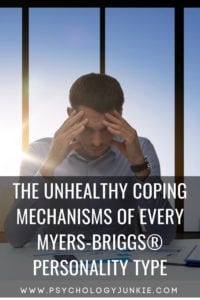
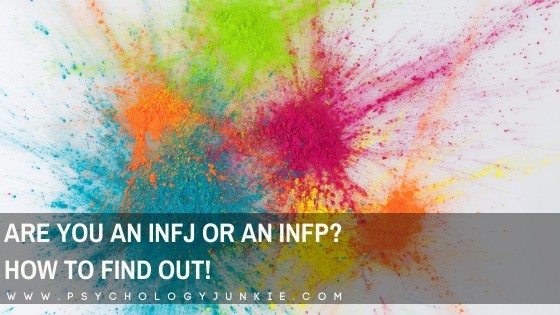






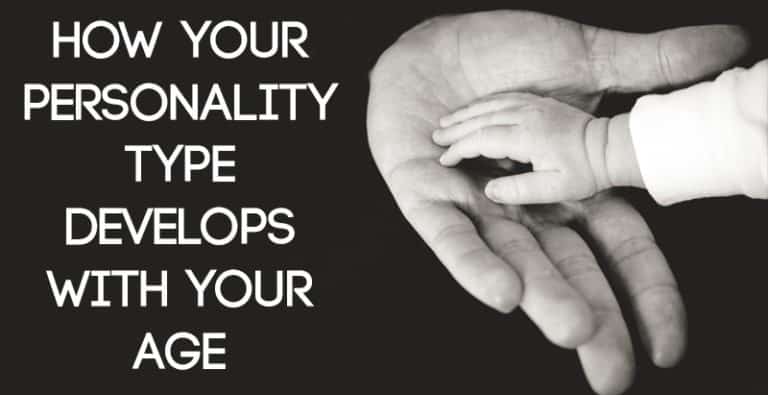
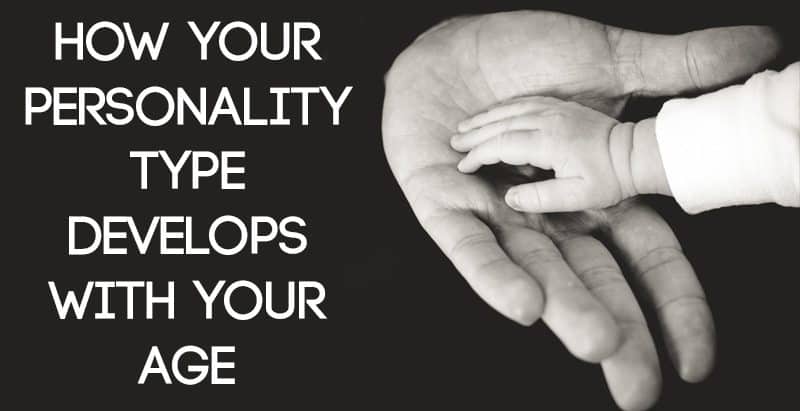


Hi Susan,
Wow! This is extremely helpful!
As an ENFP, I would add that when our ideas are not validated and at least considered, and we are unhealthy, we tend to feel hopeless, ideas might shut down completely, and any desire to be reasonable, or be around the people we see as invalidating is flattened.
A healthy ENFP would be able to handle the rejection of their ideas, because they do not need approval from others. They are grounded in self-compassion and are not trying to fix the world, but relax into the flow of the moment. Ideas flow, and if rejected, no worries, other ideas will come:)
that’s a very interesting input. I am an ENFP and I indeed tend to be extremely debative and use logic to desperately prove the person wrong. I also tend to be self-righteous. People never expect such opinions and behaviours from me because I always come across as funny and open-minded, so I notice that my friendships simply cease after a discussion, or I never see the person again. But people, of course, never show that they didn’t appreciate the talk and I regret their hypocrisy. Given that I am unapologetically myself, I expect people to be true to me but they almost never are.
Hi Susan,all these inputs are interesting to know for all the types and get to really take a great check on myself. I’m a fellow female INTJ and when I go unhealthy, just as you have stated for one of the points, one of my symptoms will be extremely perfectionistic and task-focused,though I won’t feel that my way is the only way out of it. But I would like to just add on a bit, not sure about other INTJs, but for me,another symptom of mine is self-destruction,whereby I will become impulsive when doing things.